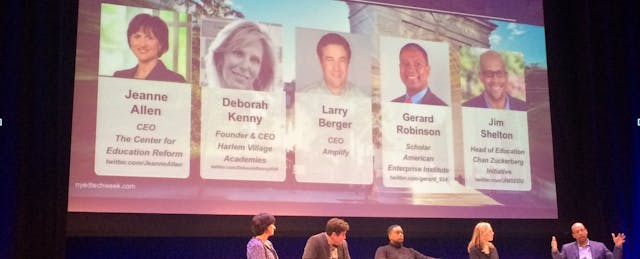“It’s not about left wing, right wing—it’s about giving kids a set of wings,” self-proclaimed policy optimist Gerard Robinson, a scholar with American Enterprise Institute, shared with this year's audience at the NY EdTech Week, sponsored by NYU Steinhardt and StartED. The last edtech conference of the year kicked off with a series of reflections by some well-known edtech pundits on the challenges and opportunities at the intersection of education and technology, including around how to assess learning, improve accessibility and catalyze procurement reform.
The event, planned to last for two full days in spite of its name, had a slightly disheveled, giddy cadence.
A pre-event kick off party marked the debut of “the Edtech Factory,” a co-working facility managed by entrepreneur-investor John Katzman and his Noodle Companies. Katzman says the 25,000 square foot space, which officially opens in 2017, will host companies including Renaissance Learning, Cognotion, ExecOnline, and others. Exactly 42 years ago, that very space rocked to a different beat: the location was one of Andy Warhol's “factories”—and the site of his Christmas party that year.
On Tuesday, founder and CEO of Harlem Village Academies, Deborah Kenny took to the center stage to launch a discussion about diversifying methods for assessing learning and broadening our definitions of success. The notion that there are different types of learners who require a flexible and creative approach to assessing growth continued to pop up throughout the day, as did the complexities of those hard-to-assess qualities such as grit.
While reflecting on lessons learned about what is working and where we’ve gone wrong, Amplify’s CEO Larry Berger elegantly described how great teachers aren’t fearful of the moment when a child feels masterful—but that algorithms don’t seem to like it.
The term “accessibility” got a lot of play, but wearing multiple hats: access for struggling learners, for low income students and for students who learn differently. Berger highlighted the need to provide multiple points of access for each learning experience. To illustrate the lack of accessibility of a particular text, Berger reminded us of the age-old story of a class where most students are reading the Declaration of Independence even as a small group of students struggle through “My Corner Store.”
Jim Shelton, who leads the education work at the Chan Zuckerberg Initiative, called it “Bloom’s two sigma problem.” In other words, put any child into an idealized learning environment—say, working with a high quality, individual tutor--and the child's performance will likely improve by two standard deviations, Shelton says: In other words, a student at the 50th percentile will rocket up to the 90 percentile. “It’s not about the kid. It’s...can we provide every child that kind of learning experience at a cost we’re willing to pay?”
“Some people get mad when I add that last part,” Shelton conceded. “But the only way we have a shot at achieving those outcomes at a cost that we seem to be willing to pay is if tech has a role.”
A half dozen startup companies, which had just finished a three-month long incubator, presented. (Descriptions here.) Other panels and speakers tackled student achievement from a variety of angles:
New York University President Andrew Hamilton touched on affordable access. Seth Andrew, former Senior Technology Adviser to the White House, noted that especially as we experiment with bandwidth hungry applications such as virtual and augmented reality, we need to continue to address issues of broadband equity and access.
A panel (moderated by EdSurge’s Betsy Corcoran), explored the role of research in demonstrating the efficacy of edtech programs. Susan Fuhrman, President of Columbia Teachers College, contended that edtech companies should have (at a minimum) an advisor or senior people who have done research on education. Bart Epstein, chief executive of the Jefferson Education Accelerator, said that next year, his group will unveil “NERD”—or the National Education Researcher Database, which will aim to help entrepreneurs find any of the 10,000 or so education researchers in the US. Chip Paucek, chief executive and cofounder of 2U, noted that as companies collect more data on student achievement, clarity around the ethics of how to handle the data become increasingly important; in his company's case, the schools—not 2U—own the data, he added.
And most panelists danced lightly around the question of what the next administration might do for education.
“Remember, you look to Washington for ‘an’ answer, not ‘the’ answer, cautioned Robinson, who has been actively advising the incoming president’s team.
“Having a national dialogue around education philosophy” is paramount, said Jeanne Allen, founder of the Center for Education Reform.
“A lot of the awakening—that we have ed problems everywhere—is a healthy redefinition of what the challenges are,” added Berger. “There’s a world of hurt out there. Addressing that everywhere is a more universal mandate.”
Fallon Wilson contributed to this report.
Editor's note: John Katzman is an investor in EdSurge.


